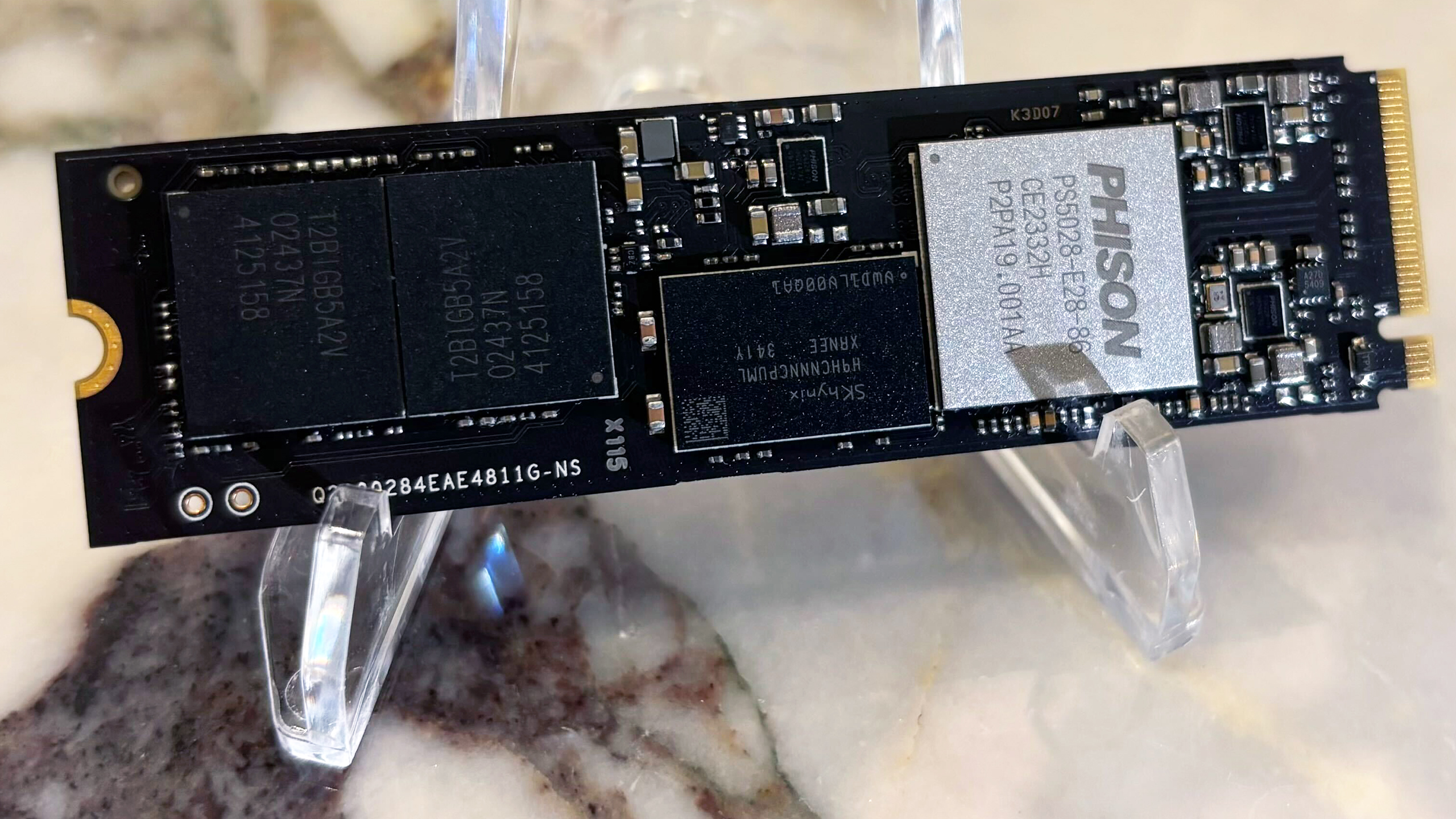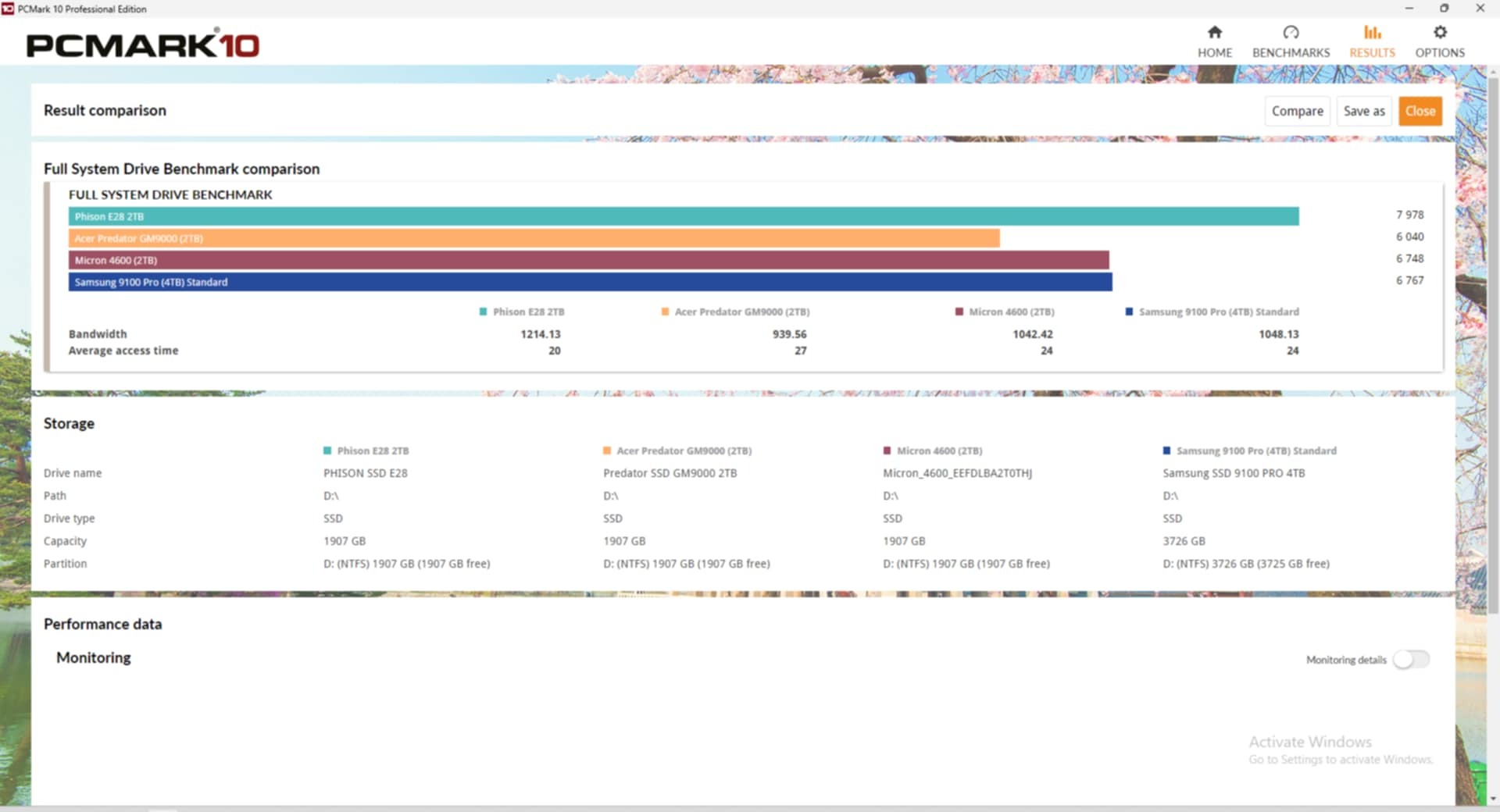Exclusive: Unreleased Phison E28 SSD beats the fastest SSDs on the market in new benchmark

Earlier this year, Phison announced the PS5028-E28, the company's next-generation PCIe 5.0 SSD controller. While PCIe 5.0 drives utilizing this high-performance controller are expected to be available later this year, Tom's Hardware has obtained an exclusive preview of the E28's capabilities.
The Phison E28 SSD faced three formidable competitors: the Samsung 9100 Pro, Micron 4600, and Acer Predator GM9000. The benchmark utilized for the comparison was PCMark 10, specifically the Full System Drive test, which offers a realistic representation of each SSD's real-world performance. The tests evaluate everyday tasks, such as opening specific applications or games, and copying files of different formats from one destination to another.
Although the results originate from a thoroughly vetted and trustworthy source, we advise exercising caution when interpreting them. The PCMark 10 scores indicated that the Phison E28 significantly outperformed its competitors. It was approximately 18% quicker than the Samsung 9100 Pro and Micron 4600. Furthermore, the Phison E28 surpassed the Predator GM9000 by as much as 32%.
Phison PS5028-E28 SSD Benchmark
SSD | Phison E28 | Samsung 9100 | Micron 4600 | Acer Predator GM9000 |
|---|---|---|---|---|
PCMark 10 Score | 7,978 | 6,767 | 6,748 | 6,040 |
Bandwidth (B/s) | 1,214.13 | 1,048.13 | 1,042.42 | 939.56 |
Average Access Time (μs) | 20 | 24 | 24 | 27 |
The PCMark 10 storage benchmark also yielded two additional metrics worth examining. The software assessed each SSD's bandwidth and average access times. A higher score indicates better bandwidth performance, whereas a lower score is preferred for access times.
The Phison E28 exhibited 16% higher bandwidth than the Samsung 9100 Pro and Micron 4600. Compared to the Predator GM9000, the Phison E28 stretched the margin to 29%. Meanwhile, the Phison E28 demonstrated 17% lower average access times than the Samsung 9100 Pro and Micron 4600. As expected, the gap between the Phison E28 and Predator GM9000 was more significant, up to 26% lower for the former.

The sequential performance difference between the Samsung Presto and Phison E28 controllers appears minimal on paper. The former has a 2% faster sequential read, and the latter has an 8% faster sequential write. The random performance, however, significantly inclines to the Phison E28 with 36% better random reads and 15% better random writes.
The PCMark 10 results show that the Phison E28 is faster than the Samsung Presto and the Silicon Motion SM2508, which seem to share comparable performance. However, as the results corroborate, not all SM2508-based drives offer the same level of performance. The type of NAND is a huge differentiator.
Get Tom's Hardware's best news and in-depth reviews, straight to your inbox.
Despite featuring the same SM2508 controller, the Micron 4600 and Predator GM9000 have a huge performance delta. The former leverages Micron 276-layer B68S FortisFlash NAND clocked at 3,600 MT/s, whereas the latter utilizes Micron 232-layer B58R FortisFlash at 2,400 MT/s.
SSD | Phison E28 | Samsung 9100 Pro | Micron 4600 | Acer Predator GM9000 |
|---|---|---|---|---|
Controller | PS5028-E28 | Presto | SMI SM2508 | SMI SM2508 |
Capacity | 2TB | 4TB | 2TB | 2TB |
Sequential Read (MB/s) | 14,500 | 14,800 | 14,500 | 14,000 |
Sequential Write (MB/s) | 14,500 | 13.,400 | 12,000 | 13,000 |
Random Read (IOPS) | 3,000,000 | 2,200,000 | 2,100,000 | 2,000,000 |
Random Write (IOPS) | 3,000,000 | 2,600,000 | 2,100,000 | 1,600,000 |
We cannot definitively declare a winner based solely on a single benchmark, and it would be wrong to do so. SSD controllers or SSDs in general may exhibit strong performance on specific workloads while demonstrating underperformance in others. Reviews hold significant value as they evaluate across a variety of workloads. As far as PCMark 10 is concerned, the Phison E28 appears superior to the Samsung Presto and Silicon Motion SM2508.
Other manufacturers of SSD controllers, such as InnoGrit (commonly referred to as Yingren Technology in China), Marvell, and Maxio, are also present. Nonetheless, the competition for the leading PCIe 5.0 SSD controller primarily lies among the big three (Phison, Samsung, and Silicon Motion) unless InnoGrit presents a more competitive offering. Currently, Phison, with its E28 model, seems to possess a competitive advantage over the competition.

Zhiye Liu is a news editor, memory reviewer, and SSD tester at Tom’s Hardware. Although he loves everything that’s hardware, he has a soft spot for CPUs, GPUs, and RAM.
-
Notton Fastest is all fine and dandy, but what about heat output and power consumption/efficiency?Reply
We're finally seeing mobile chips with PCIe 5.0, so it's about time SSDs caught up with efficiency. -
thestryker Reply
This one will be on a more advanced node so compared to the rest of the high performance controllers it should be good. I imagine it will be closer to that of the high performance PCIe 4.0 controllers than current high performance PCIe 5.0.Notton said:Fastest is all fine and dandy, but what about heat output and power consumption/efficiency?
I'd expect that the slower E31T, 4 channel, controller they released last year would be the one for laptop usage. That was their first PCIe 5.0 controller on a more advanced node (I believe one of the N7 ones) and is close to the lower power PCIe 4.0 controllers: https://www.tomshardware.com/pc-components/ssds/pny-cs2150-2tb-ssd-review/2 -
emike09 Reply
And bigger SSDs, also for cheaper. PCIe 4.0 NVMe drives are plenty fast for what I do. I get that datacenter and some professional workloads could benefit, but the average consumer, even most professionals, don't need those speeds.S58_is_the_goat said:We need cheaper ssd's not faster ones. -
Amdlova On my daily basis using a enterprise nvme pci-e 3.0 to an enterprise pci-e nvme 4.0 don't see any gains... Maybe it's windows thing. I will wait that new ones pci-e 5.0 drives comes down price.Reply
I want to get an asus h770 board do finally do some optane raid 0 have two spare 280gb 900p here -
DougMcC That table .... Bytes per second? Is it maybe MB/s? That would still seem low but GB/s would seem too high.Reply -
thestryker Reply
MB/sDougMcC said:That table .... Bytes per second? Is it maybe MB/s? That would still seem low but GB/s would seem too high. -
Mr Majestyk Reply
Yes indeed, all I need is affordable 8TB drive for my photo library no need for PCI-E 5.0 at all. Unless we see a breakthrough in and that allows random performance approaching Optane, there is virtually no real world benefit to even going beyond PCI-E 3.0 unless you do sequential transfers all day for a living.emike09 said:And bigger SSDs, also for cheaper. PCIe 4.0 NVMe drives are plenty fast for what I do. I get that datacenter and some professional workloads could benefit, but the average consumer, even most professionals, don't need those speeds. -
DonQuixoteIII SSD's, like most things tech, need to be tested like for like to have any validity. This test is flawed by using a 4TB Samsung against 2TB for everyone else. Dr.Pabst must be laughing his ass off.Reply -
VizzieTheViz Reply
I’m all for faster ssd’s but I’d really really like for software to catch up and USE all that speed.S58_is_the_goat said:We need cheaper ssd's not faster ones.
Apps and games with shorter startup/load times? Yes please!
As it is I notice no difference in my PCIe 5.0 T705 SSD and my NM970 PCIe 4.0 (and not really any difference with the PCIe 3.0 Samsung whatever its number was in my previous pc).
I want that experience I had with my first Intel postville sata ssd: really REALLY noticing my pc is a lot faster.
All the numbers keep going up on SSD’s but the experience using a pc doesn’t change a bit.
That said cheaper 8TB or bigger SSD’s for simple storage would be nice too.